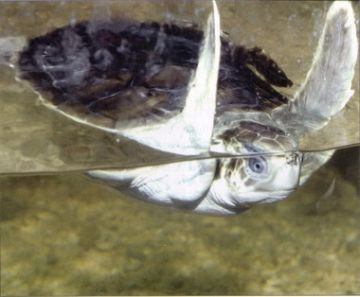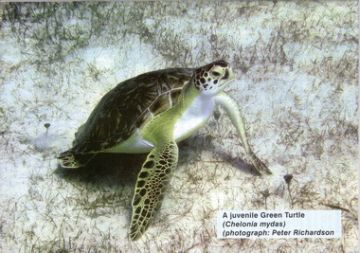Our Conservation Appeal for 2007 is being made on behalf of marine turtles worldwide. All over the globe in the oceans and seas where turtles exist, the numbers are declining. Often where only a few decades ago nesting females came ashore in their thousands to their beaches - the selfsame beaches where they were born - to lay their eggs, there are reducing rookeries. If the tale of decline continues at the current levels eventually the sight of a sea turtle - that gentle, lumbering giant of the seas - will become a rarity.
CAUSES OF DECLINE
The causes of this decline are very well known. The nesting beaches are being developed to provide facilities for tourists and made unusable for turtles. Their eggs are being sought by predators, both human and animal alike. Fishermen are using nets and lines, which trap and drown turtles. The oceans carry increasing amounts of pollution which choke and spread disease among these creatures. Turtle flesh and blood is considered a delicacy or aphrodisiac in some parts of the world and turtle products can still be seen openly on sale occasionally -probably much more commerce goes on "under cover". And all this despite all the treaties, conventions and legislation enacted by almost all the nations of the world. Moreover, there are the natural disasters such as hurricanes and a tsunami which destroys nesting beaches overnight or swamp nests. The latest example of man-made destruction of an important beach occurred in the Lebanon where oil spilled onto a Green Turtle beach caused by Israeli shelling of an oil terminal in the recent war.
HELPING HANDS FOR TURTLES
But not all is doom and disaster. There are many dedicated scientists and enthusiastic individuals the world over doing their level best to save these wonderful beautiful and inoffensive creatures. Only through a better knowledge of their habitat and a greater understanding of their habits can we hope to implement measures to save the marine turtles. The use of satellite telemetry to track the females on their routes from the nesting beaches leads us to plot the sites of their important foraging areas. We have learned that often they are following warm currents or pursue drifting streams of jellyfish as part of their life-style. Tourist organisations and local populations are encouraged to protect turtle nesting beaches and the nests while the season lasts - and volunteers come from all over the world to do likewise. Governments are lobbied by such important NGOs as MEDASSET to establish Marine National Parks to protect important nesting beaches - and to force the laws they have enacted. Veterinary experts are developing new ways of successfully treating injured and diseased turtles and rehabilitating turtles which become stranded. Turtle eggs are being rescued and relocated where they have been laid in vulnerable areas and many are incubated artificially and the hatchlings released safely. But it is a long slow process - especially when one considers that of every hundred eggs laid only two or three are expected to produce adult turtles to continue the regeneration of the species.
HOW DOES THE BCG HELP?
Marine turtles are a most important part of the world of chelonia - so what does the BCG do to help with your support? Firstly we have helped financially those researchers who are gathering information on Marine Turtles. Dr. Brendan Godley of the University of Exeter has been leading expeditions to N. Cyprus for many years building up a vital set of statistics and has always been supported by the B.C.G. In TESTUDO we have given publicity to studies which we have helped to fund. In this respect please note that in the 2006 edition there were articles about marine turtles in Ghana, Thailand, India and the Lebanon. Over many years we have supported satellite telemetry of turtle travels (an expensive item with the cost of transmitters and tracking results), helped fund volunteers undertaking nest protection and taken part in public awareness campaigns. There were occasional grants - but this year, 2007, I appeal to you to devote the whole of our efforts in our Annual Appeal to the cause of saving the marine turtle. The eminently respected and widely distributed Marine Turtle Newsletter is publishing our notice inviting organisations and individuals involved in marine turtle conservation and protection efforts to make applications for financial assistance from the B.C.G. in the next few months until 1 March 2007. Where we are completely satisfied that the work will make a significant contribution to the conservation of marine turtles we will make grants of up to £1000 each - and this invitation is extended to members of the BCG The applications (in duplicate) must be made to me and in the first instance when they will each be vetted by me and Anne Rowberry (the Deputy Conservation Officer). Ultimately the whole B.C.G. Committee's approval will be needed before a grant is made.
You can make a donation when you renew your membership by adding the amount you wish to donate to the form or you can send a separate donation by cheque. Please make the cheque out to the British Chelonia Group, specifying that you want the money to go to the 2007 Conservation Appeal and send this to:
The Membership Secretary B.C.G.,
P.O. Box 1460,
Bedworth,
CV12 9ZR.
This appeal is URGENT - the need is GREAT - so please give generously to the 2007 Conservation Appeal. Thank you for helping the marine turtles.
BOB LANGTON, CONSERVATION OFFICER (1989 - 2008).
Top



